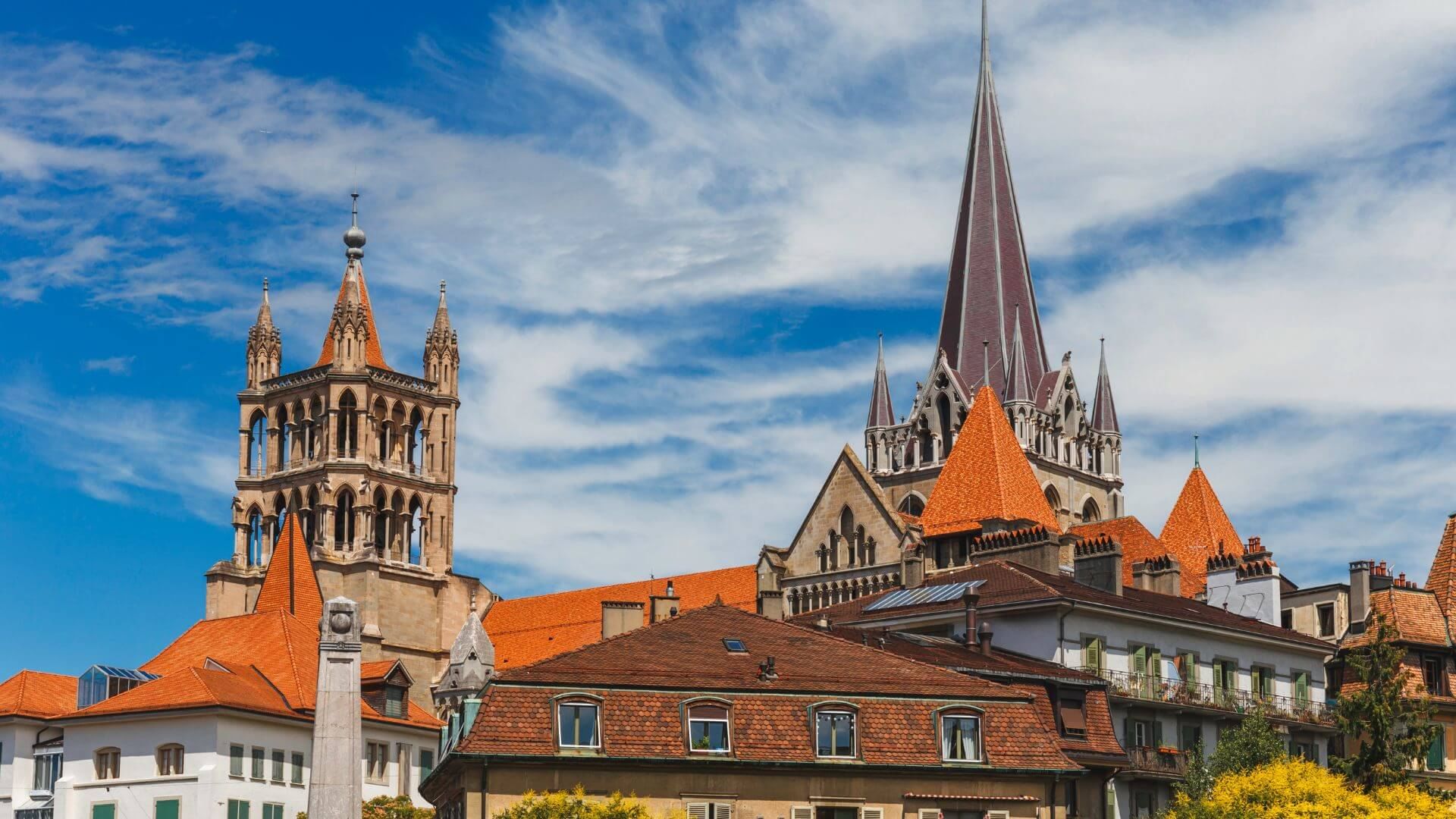Switzerland remains one of the wealthiest and most attractive European nations. The idyllic Alpine lifestyle, unwavering political and economic stability, advanced healthcare and unparalleled quality of living this country offers come at a good price. This is so much so that Mercer’s 2023 Cost of Living City Ranking featured three prominent Swiss cities – Zurich (fifth), Geneva (eighth), and Bern (tenth).
However, Switzerland’s steep cost of living doesn’t seem to deter students from flocking to its shores. The country ranks as the 14th most popular destination for British expats, according to reports. As per statistics from the Swiss office about Switzerland’s foreign population stands at just over 2.2 million people, making up a sizeable quarter (25.3%) of the nation’s total populace of almost 8.7 million.
Cost Of Living Calculator
| Description | Cost (£) |
|---|---|
| Total Cost of Accommodation | 100 |
| Total Cost of Transport | 50 |
| Total Cost of Utilities | 30 |
| Total Cost of Food | 70 |
| Total Estimated Cost | 250 |
The Cost Of Living In Switzerland For Students
Students’ living costs in Switzerland can range from €2,536 to €2,736 per month. The table given below lists the exact monthly breakdown:
| Items | Cost Of Living In Switzerland (Monthly) |
| Off-Campus Accommodation | €1,046 |
| On-Campus Accommodation | €1,245 |
| Transportation | €80 |
| Food Cost | €900 |
| Utility Cost | €224 |
| Entertainment | €76 |
| Groceries | €52 |
| Clothes | €158 |
| Total Cost of Living with Off-Campus Accommodation | €2,536 |
| Total Cost of Living with On-Campus Accommodation | €2,735 |
| Annual Cost of Living | €30,432 |
Cost of Living for Indian Students
Indian students can expect to incur similar costs for tuition fees, travel expenses, groceries, food, clothes, healthcare, etc.
| Aspect | Cost (EUR/month) | Cost (INR/month) |
| Cost of Living | €1,000 – €1,500 | INR 1 – 1.5 lakh |
| Accommodation | ||
| Campus halls | €400 – €800 | INR 40,000 – 80,000 |
| Sharing an apartment | €600 – €800 | INR 60,000 – 80,000 |
| Staying with a host family | €200 – €400 | INR 20,000 – 40,000 |
| Food | ||
| – Supermarket bills | €200 | INR 20,000 |
| – Restaurant meals | €20 | INR 2,000 |
| – Canteen meals | €7 | INR 700 |
| Transportation | €50 | INR 5,000 |
Education Expenses In Switzerland
Switzerland is well known for its excellent educational system, which provides both domestic and foreign students with a broad choice of educational options. However, when making plans for education in Switzerland, it’s crucial to take the related costs into account.
University Tuition Fees
Given below is a table demonstrating the tuition fees of various course levels in Swiss universities. Go through the table for a thorough understanding.
| Programmes | Tuition Fees (EUR/year) |
| Bachelor’s Programmes | €400 – €3,700 |
| Master’s Programmes | €400 – €3,700 |
| PhD Degrees | €100 – €900 |
| Private Schools | Up to €43,000 |
| Scholarships and Financial Aid | Available from Swiss universities and external organisations to cover tuition fees, living expenses, and other educational costs. |
Fees At Leading Universities In Switzerland
As mentioned earlier, Switzerland is known for its quality education. However, the fees at these universities are higher. You must be financially prepared to undertake any course at these universities. The overall fees are as follows:
| University | Annual Tuition Fee (EUR) | Annual Tuition Fee (INR) |
| The University of Geneva | €900 | INR 81,608 |
| University of Applied Sciences and Arts FHNW | €1,300 | INR 1,17,872 |
| University of Bern | €1,500 | INR 1,36,007 |
| ETH Zurich | €1,600 | INR 1,45,074 |
| University of Lausanne | €1,500 | INR 1,36,007 |
| University of Basel | €1,600 | INR 1,45,074 |
| University of Zurich | €1,400 | INR 1,26,931 |
| Ecole Polytechnique Fédérale de Lausanne (EPFL) | €1,100 | INR 99,731 |
Housing Expenses In Switzerland For Students
Looking for affordable housing is a major challenge for international students studying in Switzerland. Your cost of living in Switzerland majorly depends on the location, proximity to the university, food, convenience, etc. Here, we will take a deeper look into the on-campus and off-campus accommodation separately:
Cost Of Accommodation In Top 4 Cities Of Switzerland
From the bustling streets of Zurich to the picturesque charm of Geneva, understanding the accommodation costs of these cities is quite important. Refer to the below section for more information:
Zurich
According to Mercer’s 2023 report, Zurich secured the fourth position among the world’s most expensive cities. Cost survey websites highlight Zurich’s exorbitant expenses for dining at budget-friendly restaurants, gym memberships, imported beer, and taxi fares. They estimate Zurich’s overall living costs to be:
- 80% higher compared to Brussels
- 74% pricier than Munich
- 60% more expensive than Paris
- 56% costlier than London
- 28% dearer than New York
| One Bedroom Apartment | €1,822 |
| Three-Bedroom Apartment | €4,341 |
Basel
Research carried out by ECA International reveals that Basel secures a position within the top ten most costly cities globally when it comes to everyday essentials like vegetables, cigarettes, clothing, household appliances, and other fundamental necessities.
| One Bedroom Apartment | €1,158 |
| Three-Bedroom Apartment | €2,233 |
Bern
Bern has a low cost of living compared to the other 3 cities mentioned in this section. It is moderately priced and the overall cost of travel here is fair for the region and comparable to Chamonix-Mont-Blanc or Mykonos.
| One Bedroom Apartment | €1,075 |
| Three-Bedroom Apartment | €2,232 |
Geneva
Mercer ranked the cost of living in Geneva as the eighth-highest in the world. Online cost surveyors estimate Geneva’s cost of living to be:
- 59% more expensive than in Brussels
- 54% more expensive than in Munich
- 42% more expensive than in Paris
- 38% more expensive than in London
- 13% more expensive than in New York
| One Bedroom Apartment | €1,737 |
| Three-Bedroom Apartment | €3,143 |
Transportation Costs In Switzerland
Let’s look at some of the transportation costs of public and private vehicles in Switzerland and how to deal with them:
| Particulars | Description |
| Average Monthly Expense | €80 is the average monthly transportation cost in Switzerland. |
| Train Travel | Students may qualify for discounts on passes or student-only tickets. |
| Travel Cards | Swiss Travel Pass Half Fare Card Provides unlimited public transit travel options. |
Cost Of Food In Switzerland Per Month
Managing food and grocery bills is an important component of budgeting as a student in Switzerland. Cost of Living in Switzerland and Food prices might vary depending on personal preferences, nutritional needs, and shopping patterns. Students typically opt for home-cooked meals rather than eating out regularly, with occasional dining-out experiences. Refer to the table below for an overview:
| Particulars | Description |
| Food Prices | Monthly expenditure on food ranges between €400 and €550 |
| Grocery Shopping Tips | Consider shopping after 5 p.m. for discounts of 25 to 50 per cent on perishable items. |
| Dining Out Costs | Lunch at restaurants typically ranges from €16 to €27 per person. |
Grocery Expenses
A Swiss student can expect a €52 of average monthly food expense. You must explore low cost supermarkets or grocery stores and compare the pricing and incentives by them.
How To Save Money On Groceries?
Here is how you can save an arm and leg while living in Switzerland. Following these simple tips can help you save on your grocery shopping to a huge extent:
Try Out Cheaper Foods
Instead of splurging on premium cuts like entrecôte or beef fillet, consider more affordable alternatives such as chicken and ground beef. Vegetables and legumes are generally much cheaper than meat products. Additionally, you can achieve substantial savings by purchasing budget brands (such as Prix Garantie from Coop or M-Budget from Migros).
Buy The Sales
Taking advantage of special promotions can be a money-saving strategy. For non-perishable items like noodles, rice, cleaning supplies and preserves, stocking up during sales can be financially beneficial. Swiss supermarket chains Coop and Migros, as well as discount grocery stores like Aldi, Denner and Lidl. The discounts typically range from 15 to 20 percent off the regular price, but occasionally, even better deals can be found.
Shop By Red Dots
Seeking out items marked with discount stickers, commonly known as “red-dot shopping,” is a quick and easy way to save money in Swiss supermarkets. Major retailers like Aldi Suisse, Coop, Denner, Lidl, and Migros discount groceries nearing their expiration dates. The discounts are clearly indicated, typically with a red or orange sticker, and usually offer 25 or 50 percent off the standard price.
Shop At Farm Stalls
No matter where you live in Switzerland, there’s a good chance that farms are located nearby. Many farms sell fresh produce directly to the public through farm stalls and the prices for fruits and vegetables at these stalls are often lower than those of equivalent produce in supermarkets.
Fight Food Waste
The Too Good To Go app has gained popularity. You can use this app to purchase surprise packages filled with an assortment of groceries left over at closing time. The app informs you when to pick up the package. Too Good To Go partners include various supermarkets, restaurants, bakeries and takeaways.
Other Miscellaneous Costs
Generally speaking, studying abroad is not just for students to study but also to experience a different country and its culture. Hence, students might incur some additional expenses like entertainment, or even healthcare. Below is an overview of the same:
Entertainment Costs
If you plan to catch a movie or a sightseeing adventure, the following costs will help you be prepared:
- A ticket to the cinema is around €20.
- Visiting an exhibition or museum in Switzerland can cost around €10. However, some museums offer open days during the week where admission is free of charge.
- A gym subscription in Switzerland costs about €80 per month.
The total entertainment cost will vary between €70 and €100.
Restaurant Costs
Switzerland is renowned for its dining options but the cost of eating out can be prohibitive for many families. A simple value meal from McDonald’s costs around €15, while a three-course meal for two at a mid-range restaurant can cost approximately €100, or around €25 per person at an inexpensive eatery or for takeaway pizza.
Beer, Wine & Spirits In Switzerland
Switzerland offers a wide variety of alcoholic beverages to suit different tastes. White wine is a popular accompaniment to fondue and beer enthusiasts will find an extensive selection to choose from. On average, a pint of beer at a bar costs between €6 and €7. The country is home to numerous vineyards and a mid-range bottle of wine typically costs around €15, according to price surveys.
Coffee In Switzerland
Coffee is a popular beverage in Switzerland but it comes at a premium. A regular cappuccino costs an average of €4.70, with the price increasing to €5 in Zurich – significantly higher than in other European capital cities like London, Paris, and Berlin.
Healthcare Costs In Switzerland
Budgeting and planning for healthcare is a crucial aspect of assessing the cost of living in Switzerland. The Swiss Federal Law on Health Insurance governs healthcare in Switzerland and offers universal coverage. Even though the state does not offer free healthcare, everyone living in Switzerland must have private health insurance within three months of moving here or being born.
The typical monthly health insurance premium sits around €319. However, opting for cut-rate coverage often comes with the risk of unexpected out-of-pocket expenses rearing their unwelcome head down the line.
Hospital stays, and medical expenses are covered by health insurance coverage. Nonetheless, a percentage of the treatment costs must be covered by the insured person. Included in this is an annual deductible called the franchise, which for individuals can be as little as €300 or as much as €2,500 (premiums are adjusted accordingly). Furthermore, there is a 10% fee for expenses that go beyond the deductible, up to a stop-loss amount of €700.
Factors Affecting Cost Of Living In Switzerland
Living in Switzerland is an unforgettable experience. They offer amazing services, high-class amenities, and so much more. The factors that have influenced the high costs of living are a strong economy, high salaries, and the standard of living. The housing costs have also increased due to excessive immigration in recent years. Switzerland is also a tourist destination. Needless to say, tourist destinations are majorly costly by default! You should be considering these things while planning to settle down in this city.
Is Switzerland Expensive For The Students?
Yes, Switzerland is a bit expensive for the students taking into account the accommodations, and other accessibility costs. But you can always take support from financial institutions or scholarships to back up your expenses and to live at ease.
Scholarships In Switzerland For Indian Students
There are many scholarships offered by the Indian Government and the external organisations in Switzerland to the Indian students studying in Switzerland and other nations or cities. Let’s look at the most significant once given in the table below:
| Scholarship Name | Eligibility | Benefits |
| Fulbright-Nehru Master’s Fellowship | All masters programmes | Fully funded, sickness coverage, medical expenses, living costs’ |
| Lady Meherbai D Tata Education Trust Scholarship | Indian women graduates. | Female students studying abroad in areas like social work, public health, etc. |
| Erasmus Mundus Joint Master Degree | Bachelor’s degree or students in the final year. | Funds for study, research, placement, thesis, etc. |
| Padho Pardesh Scheme For Minority Students | Family income below Rs. 6 lakhs | Interest subsidy on student loans. |
| Agatha Harrison Memorial Fellowship | Academic record of at least 60%, student age should be between 30-40 years. | Covers travel allowance, lunches, stipend, six high table dinners, and administration charges Includes economy air travel as part of the travel allowance. |
Other Financial Aid For Students Studying In Switzerland
Solely relying on scholarships can be risky, as they are highly competitive. Hence you must have a strong financial backup of student loans. UniCreds has partnered with the top banks in India as well as NBFCs to give you the best abroad education loans at lower processing fees. Here is an overview of the top financial institutions who have partnered with UniCreds and the interest and loan amount you can expect:
| Bank Name | Loan amount | Interest Rates |
| HDFC Credila | Rs. 1.5 Cr. | 11-12.05% |
| Union Bank of India | Rs. 1.5 Cr. | 9-10.5% |
| Bank of Baroda | Rs. 1.5 Cr. | 9.7-10.2% |
| Prodigy Finance | Rs. 1 Cr. | 10-13% |
| Avanse | Rs. 1.5 Cr. | 10-13% |
How To Save Money As A Student In Switzerland?
Switzerland can be an expensive country to study in. However, there are plenty of ways in which you can save money. Here are some tried and tested ways in which students were able to lower their costs while visiting Switzerland:
Student Travel Card
For students under 25, purchasing the Night Travelcard for €100 is suggested. This offers unlimited travel between 7 pm and 5 am. This budget-friendly option makes late-night excursions to clubs like Zukunft in Zurich more accessible.
Affordable Places To Shop
It’s noted that in Bern, it wasn’t uncommon for students (and the Swiss) to catch the ferry to Évian-les-Bains which is a French city across Lake Geneva. You can do this to stock up on pantry essentials at food markets. Consider it their version of a Costco run.
Rent A Bicycle
Renting a bike is advised as a wallet-friendly way to explore Swiss cities. Options like Züri rollt (free bike hires in Zurich), Velospot, RentABike (with student discounts) and Publibike (a bike-sharing app) make cycling accessible and affordable.
City Passes
Taking advantage of city passes that offer free public transport and discounted entry to attractions like Lausanne Cathedral and the Olympic Museum is recommended, provided your accommodation pays the overnight tourist tax.
Grocery Shopping
Grocery shopping across the border in nearby French towns can be a cost-effective way to stock up on essentials, as students were observed doing during their time in Basel.
Eat lunch specials
If you are going to eat out, do so during lunch when most lunch specials at cafes and restaurants cost around €10 – €19. It’s the cheapest time to eat out.
Use BlaBlaCar
To save money and have a more local experience, consider using the ride-sharing platform BlaBlaCar as an alternative to trains. It’s similar to Airbnb but for sharing rides. However, be prepared for some flexibility as rides may get cancelled at the last moment.
Assistance With Living Costs In Switzerland
If you’re struggling to cover living expenses in Switzerland, assistance is accessible. Check out our Swiss social security pages for a comprehensive overview. Key benefits you might be eligible for include:
- Family Allowance: Starting from €200 – €250 per child
- Maternity/Paternity Allowance: Up to 80% of your average income (capped at CHF 196 per day)
- Old-Age Pension: Ranging from €1,195 – €2,390 (or CHF 3,585 for couples)
- Social Assistance: Minimum of €997 per month, adjusted based on household size.
- Unemployment Benefit: Up to 80% of your average pay over the last six months, maxing out at €1,350 per month.
Expatriates who have been working in Switzerland for at least a year may qualify for unemployment benefits equivalent to 70% of their previous salary in case of job loss.
Conclusion
It’s a wrap! This blog gives you an in-depth understanding of the cost of living in Switzerland and how it can be managed. With proper financial planning and funds, one can stay in Switzerland to pursue one’s dreams at ease!
FAQs
Q1. Is it expensive to live in Switzerland?
Ans: Yes, Switzerland is well-known for its high living costs.
Q2. How much money does a student need in Switzerland?
Ans: The amount of money required by a student in Switzerland varies, but a monthly budget of €1,000 to €2,000 or more is recommended.
Q3. What are the fees for Indian students in Switzerland?
Ans: Private educational schools in Switzerland frequently charge higher tuition costs, which might exceed 43,000 EUR, i.e. 38,69,716 INR per year in some cases, depending on the institution.
Q4. How much can international students earn in Switzerland?
Ans: In Switzerland, an international student can earn between 2,200-2,800 CHF per month, which equates to approximately 180,000 – 225,000 INR for Indian students.
Q5. Is Switzerland more costly than India?
Ans: Yes, Switzerland is often thought to be more expensive than India in terms of overall living costs.
Thank you for reading about the “Cost of Living in Switzerland.” We hope you found the information helpful in understanding the expenses associated with living in Switzerland. If you’re interested in exploring more articles on related topics, we recommend checking out the below articles:















0 Comments